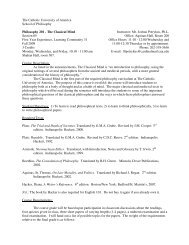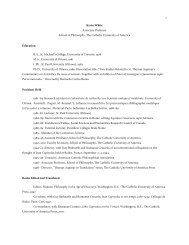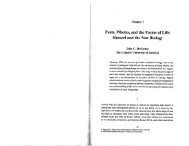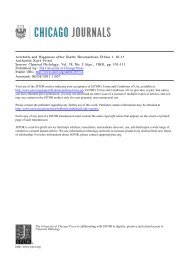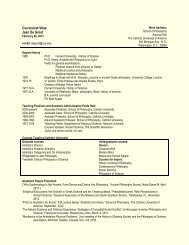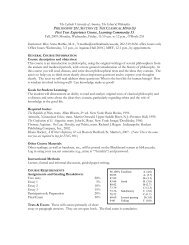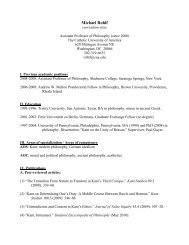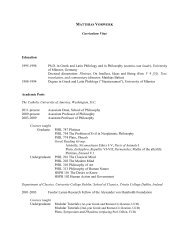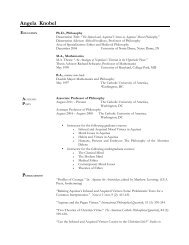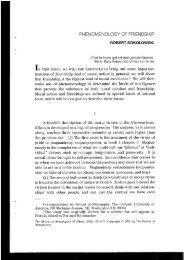Review of Essays on Aristotle's De Anima, edited by Martha C ...
Review of Essays on Aristotle's De Anima, edited by Martha C ...
Review of Essays on Aristotle's De Anima, edited by Martha C ...
You also want an ePaper? Increase the reach of your titles
YUMPU automatically turns print PDFs into web optimized ePapers that Google loves.
<str<strong>on</strong>g>Review</str<strong>on</strong>g>: [untitled]Author(s): Kurt PritzlSource: The <str<strong>on</strong>g>Review</str<strong>on</strong>g> <str<strong>on</strong>g>of</str<strong>on</strong>g> Metaphysics, Vol. 47, No. 4 (Jun., 1994), pp. 836-837Published <strong>by</strong>: Philosophy Educati<strong>on</strong> Society Inc.Stable URL: http://www.jstor.org/stable/20129605 .Accessed: 01/03/2011 21:32Your use <str<strong>on</strong>g>of</str<strong>on</strong>g> the JSTOR archive indicates your acceptance <str<strong>on</strong>g>of</str<strong>on</strong>g> JSTOR's Terms and C<strong>on</strong>diti<strong>on</strong>s <str<strong>on</strong>g>of</str<strong>on</strong>g> Use, available at .http://www.jstor.org/page/info/about/policies/terms.jsp. JSTOR's Terms and C<strong>on</strong>diti<strong>on</strong>s <str<strong>on</strong>g>of</str<strong>on</strong>g> Use provides, in part, that unlessyou have obtained prior permissi<strong>on</strong>, you may not download an entire issue <str<strong>on</strong>g>of</str<strong>on</strong>g> a journal or multiple copies <str<strong>on</strong>g>of</str<strong>on</strong>g> articles, and youmay use c<strong>on</strong>tent in the JSTOR archive <strong>on</strong>ly for your pers<strong>on</strong>al, n<strong>on</strong>-commercial use.Please c<strong>on</strong>tact the publisher regarding any further use <str<strong>on</strong>g>of</str<strong>on</strong>g> this work. Publisher c<strong>on</strong>tact informati<strong>on</strong> may be obtained at .http://www.jstor.org/acti<strong>on</strong>/showPublisher?publisherCode=pes. .Each copy <str<strong>on</strong>g>of</str<strong>on</strong>g> any part <str<strong>on</strong>g>of</str<strong>on</strong>g> a JSTOR transmissi<strong>on</strong> must c<strong>on</strong>tain the same copyright notice that appears <strong>on</strong> the screen or printedpage <str<strong>on</strong>g>of</str<strong>on</strong>g> such transmissi<strong>on</strong>.JSTOR is a not-for-pr<str<strong>on</strong>g>of</str<strong>on</strong>g>it service that helps scholars, researchers, and students discover, use, and build up<strong>on</strong> a wide range <str<strong>on</strong>g>of</str<strong>on</strong>g>c<strong>on</strong>tent in a trusted digital archive. We use informati<strong>on</strong> technology and tools to increase productivity and facilitate new forms<str<strong>on</strong>g>of</str<strong>on</strong>g> scholarship. For more informati<strong>on</strong> about JSTOR, please c<strong>on</strong>tact support@jstor.org.Philosophy Educati<strong>on</strong> Society Inc. is collaborating with JSTOR to digitize, preserve and extend access to The<str<strong>on</strong>g>Review</str<strong>on</strong>g> <str<strong>on</strong>g>of</str<strong>on</strong>g> Metaphysics.http://www.jstor.org
SUMMARIES AND COMMENTS 837refine and clarify his previous work; Kahn brings his usual measured andthoughtful perspective to <strong>Aristotle's</strong> n<strong>on</strong>-Cartesianism.Burnyeat's article with its new way <str<strong>on</strong>g>of</str<strong>on</strong>g> thinking typifies what is so goodabout this volume. There is an abundance <str<strong>on</strong>g>of</str<strong>on</strong>g> fresh ideas, new approaches to old problems, and reassessment going <strong>on</strong> with respect tothe <strong>De</strong> <strong>Anima</strong>, not <strong>on</strong>ly regarding his so-called philosophy <str<strong>on</strong>g>of</str<strong>on</strong>g> mind, butin all sorts <str<strong>on</strong>g>of</str<strong>on</strong>g> directi<strong>on</strong>s. A number <str<strong>on</strong>g>of</str<strong>on</strong>g> articles c<strong>on</strong>cern <strong>Aristotle's</strong> c<strong>on</strong>cepti<strong>on</strong> <str<strong>on</strong>g>of</str<strong>on</strong>g> life and life forms, and a good article <strong>on</strong> the sense <str<strong>on</strong>g>of</str<strong>on</strong>g> touch,which Freeland provides, is overdue. There is a vitality <str<strong>on</strong>g>of</str<strong>on</strong>g> interpretati<strong>on</strong>in the volume, as befits <strong>on</strong>e <strong>on</strong> <strong>De</strong> <strong>Anima</strong>, whatever its shortcomingsand limitati<strong>on</strong>s.There are, indeed, shortcomings and limitati<strong>on</strong>s, which go bey<strong>on</strong>d disagreements with the positi<strong>on</strong>s taken. One worth noting here is a generalnarrowness <str<strong>on</strong>g>of</str<strong>on</strong>g> visi<strong>on</strong>. As their citati<strong>on</strong>s show, many <str<strong>on</strong>g>of</str<strong>on</strong>g> the c<strong>on</strong>tributorsare involved in discussi<strong>on</strong> with a rather small and like-minded circle <str<strong>on</strong>g>of</str<strong>on</strong>g>scholarly peers, almost all <str<strong>on</strong>g>of</str<strong>on</strong>g> whom are writing in English. It is instructive to study the Bibliography which (with some mistakes) distinguishesentries cited <strong>by</strong> the c<strong>on</strong>tributors in their articles from those added <strong>by</strong>the editors and their assistant. Such a study shows how much literature<str<strong>on</strong>g>of</str<strong>on</strong>g> genuine worth is left unc<strong>on</strong>sidered or underappreciated in the discussi<strong>on</strong>s <str<strong>on</strong>g>of</str<strong>on</strong>g> the volume. One example from the start <str<strong>on</strong>g>of</str<strong>on</strong>g> the book makesthe point. In the Introducti<strong>on</strong> Nussbaum says that an adequate study<str<strong>on</strong>g>of</str<strong>on</strong>g> the extant manuscripts <str<strong>on</strong>g>of</str<strong>on</strong>g> the <strong>De</strong> <strong>Anima</strong> remains to be d<strong>on</strong>e and notesthat Ross's "<strong>De</strong> <strong>Anima</strong> work" (presumably both his 1956 O.C.T. editi<strong>on</strong>and his 1961 commentary editi<strong>on</strong>) is "the most complete account <str<strong>on</strong>g>of</str<strong>on</strong>g> themanuscripts we have" (p. 2). This is not true. Her own Bibliographycites and tags as unc<strong>on</strong>sidered in the volume the definitive study <str<strong>on</strong>g>of</str<strong>on</strong>g> PaulSiwek, Le "<strong>De</strong> <strong>Anima</strong>" d'Aristote dans les manuscrits grecs (VaticanCity, 1965). Even worse, it fails to list his superior editi<strong>on</strong>, Tractatus<strong>De</strong> <strong>Anima</strong> (Rome, 1965), which is based <strong>on</strong> 65 manuscripts in 9 families(compared to the 10 <strong>De</strong> <strong>Anima</strong> manuscripts [or 11, if e is distinguishedfrom E] used <strong>by</strong> Ross). This narrowness is a problem, no doubt, butthe lively and engaging c<strong>on</strong>siderati<strong>on</strong> <str<strong>on</strong>g>of</str<strong>on</strong>g> new ideas and new directi<strong>on</strong>sfound throughout this large and important collecti<strong>on</strong> shows (as do thefairly recent m<strong>on</strong>ographs <str<strong>on</strong>g>of</str<strong>on</strong>g> Modrak and Wedin) that scholarship <strong>on</strong> the<strong>De</strong> <strong>Anima</strong> is more alive than it has been in some time, and encouragesthe hope <str<strong>on</strong>g>of</str<strong>on</strong>g> a broader and more inclusive c<strong>on</strong>siderati<strong>on</strong> and comprehensi<strong>on</strong> <str<strong>on</strong>g>of</str<strong>on</strong>g> <strong>Aristotle's</strong> positi<strong>on</strong>s in the <strong>De</strong> <strong>Anima</strong> to come.?Kurt Pritzl, TheCatholic University <str<strong>on</strong>g>of</str<strong>on</strong>g> America.O'Meara, Dominic J. Plotinus: An Introducti<strong>on</strong> to the Enneads. Oxford:Oxford University Press, 1993. ix + 142 pp. $39.95?It is difficult toimagine a major philosopher more in need <str<strong>on</strong>g>of</str<strong>on</strong>g> introducti<strong>on</strong> than Plotinus,nor <strong>on</strong>e whose thought is so deeply resistant to summary treatment.O'Meara succeeds <strong>by</strong> awakening the beginner's interest in his subjectand reminding the specialist why it is so fascinating. First we are familiarized with the details <str<strong>on</strong>g>of</str<strong>on</strong>g> Plotinus's life, the diverse influences up<strong>on</strong>


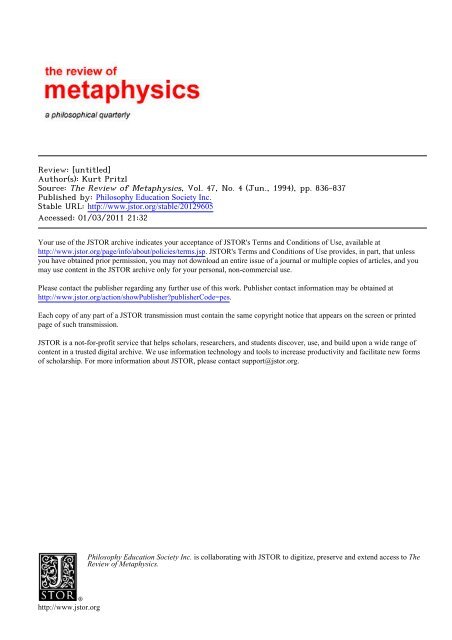
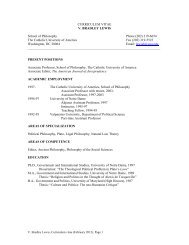
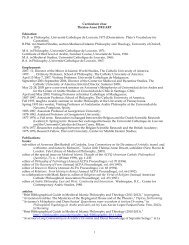
![syllabus phil 201-11[Fall 2009] - School of Philosophy - the Catholic ...](https://img.yumpu.com/36403731/1/190x245/syllabus-phil-201-11fall-2009-school-of-philosophy-the-catholic-.jpg?quality=85)
